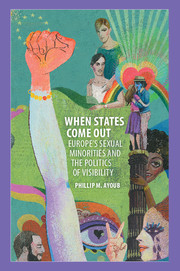Book contents
- Frontmatter
- Dedication
- Contents
- List of figures
- List of tables
- Preface and acknowledgments
- List of abbreviations
- 1 Introduction
- 2 The politics of visibility and LGBT rights in Europe
- 3 Transnational movement: Opportunities, actors, and mechanisms
- 4 Complying with new norms: LGBT rights legislation
- 5 Internalizing new norms: Attitudes toward sexual minorities
- 6 Poland and Slovenia's responses to international norms
- 7 Visibility in movement and transnational politics
- Methodological appendix
- References
- Index
- Books in the Series (continued from p. iii)
7 - Visibility in movement and transnational politics
Published online by Cambridge University Press: 05 May 2016
- Frontmatter
- Dedication
- Contents
- List of figures
- List of tables
- Preface and acknowledgments
- List of abbreviations
- 1 Introduction
- 2 The politics of visibility and LGBT rights in Europe
- 3 Transnational movement: Opportunities, actors, and mechanisms
- 4 Complying with new norms: LGBT rights legislation
- 5 Internalizing new norms: Attitudes toward sexual minorities
- 6 Poland and Slovenia's responses to international norms
- 7 Visibility in movement and transnational politics
- Methodological appendix
- References
- Index
- Books in the Series (continued from p. iii)
Summary
The tide of history only advances when people make themselves fully visible.
– Anderson Cooper, 2012During the opening days of the 2014 Winter Olympics in Sochi, Russia, activists from a group called the Gay Folks’ Movement cunningly beamed their logo onto the facade of the Russian embassy in Berlin. This visible act of solidarity was in response to a lengthy campaign by Russian and transnational activists that voiced concerns about Russia's draconian state ban on gay “propaganda.” So was Google's home page, which depicted various winter sports in the bright rainbow colors commonly associated with the LGBT movement. Beneath the design, Google quoted statements on human rights and anti-discrimination from the Olympic charter. Acts like these, which make the LGBT norm publicly visible, have gained unparalleled momentum in recent years. And more and more frequently, prominent figures across the globe, including a British diving star (Tom Daley), an Icelandic prime minister (Jóhanna Sigurðardóttir), a Latvian foreign minister (Edgars Rinkēvičs), and a Polish Catholic priest (Krzystof Charamsa), are coming out. The notable actor Wentworth Miller came out in 2013 by referencing his Russian heritage while declining to take part in the annual St. Petersburg film festival. “I cannot in good conscience participate in a celebratory occasion,” he wrote, “hosted by a country where people like myself are being systematically denied their basic right to live and love openly” (Miller 2013). Shortly afterward, the retired German soccer professional Thomas Hitzlsperger came out, saying that he did so because “gay football players so far don't exist officially” (Agence France Presse 2014). The attention Hitzlsperger's coming out attracted in Europe suggests that he has indeed helped to lift the veil of silence he decried. By September 2014, following campaigns by various LGBT rights organizations, the International Olympic Committee added non-discrimination based on sexual orientation to the Olympic charter. The addition sent a strong signal to potential host countries that have laws discriminating against LGBT people. As the visibility of the transnational LGBT community grows, it reshapes our understanding, and indeed our imaginations, about the place of LGBT people in international society.
This book has explored the effect of this increasing visibility on state and societal recognition of LGBT people across states in the European region.
- Type
- Chapter
- Information
- When States Come OutEurope's Sexual Minorities and the Politics of Visibility, pp. 199 - 224Publisher: Cambridge University PressPrint publication year: 2016

